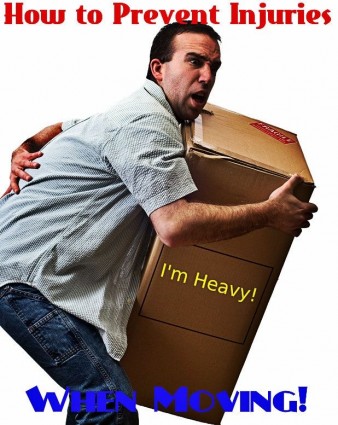Preventing Injuries While Making a Move
 It’s surprisingly easy to injure yourself or somebody else when moving out of one home and into another. From breaking fragile objects and cutting yourself, to throwing your back out trying to lift heavy furniture, moving can be dangerous for the inexperienced. While it might be safest for you to hire a moving company, if it’s a short move or you’re looking to save money, then following these tips can help you avoid any physical catastrophes.
It’s surprisingly easy to injure yourself or somebody else when moving out of one home and into another. From breaking fragile objects and cutting yourself, to throwing your back out trying to lift heavy furniture, moving can be dangerous for the inexperienced. While it might be safest for you to hire a moving company, if it’s a short move or you’re looking to save money, then following these tips can help you avoid any physical catastrophes.
The most common moving related injuries are caused by moving heavy or bulky objects that strain the lower back. The simplest way to avoid this is by using proper lifting technique by crouching down and lifting heavy objects with your legs, instead of bending at your waist to pick up a heavy box. Minor to major strains and sprains can, and likely will, occur without proper lifting technique.
Another option to further shield your back from injury is by wearing a back brace when lifting. This will help guide you toward straight posture, and help prevent serious injury like a slipped disk. Hand car dollies also serve as great options when moving large items, especially over uneven terrain. If you’re stuck moving obscenely heavy furniture that won’t fit on a dolly, look into furniture sliders to easily move the item, and protect your floors.
When moving heavy objects, broken bones can also occur, although they’re slightly less common than muscle strains. Be cautious of where your fingers are toes are as they’re easy fodder for being jammed inside door frames or squished under furniture and boxes. Invest in a pair of padded gloves or hard-toe boots to protect yourself from smashing and squishing injuries.
Limiting the weight of boxes to 50 pounds is also an option to prevent many of the aforementioned injuries. A tip by Moving Gal is one many people forget about, but if your move will include a lot of items jostling around, it’s useful to remember that “flammable items like match boxes, paint thinners, aerosol cans and other chemicals must not be loaded in the vehicle used for moving items. These items are flammable and dangerous. Professionals will not transport these items. Therefore, if you are moving yourself avoid including these items during the move.”
The weight limit also helps prevent mishaps when carrying boxes around, and it’s especially useful if you have other people helping you move. When friends or family are jumping in to help out, make sure to establish clear verbal confirmation when passing boxes among each other. It’s really easy to pass a heavy or fragile item to somebody, only to let go and discover they didn’t really have control. This is the easiest way to break toes when moving. Having an extra person walking with you to catch any mishaps is also advised.
Wearing adequate clothing is also important to prevent various injuries. Having tight-fitting clothing prevents shirts and pants from getting snagged on furniture causing you to drop it while shuffling out the door. Likewise, be sure to dress appropriately for the season, so you don’t overheat or freeze, but keep protective clothing in mind.
Checking out the new residence with moving in mind is also going to be helpful. This is a simple, but overlooked idea that can make a huge difference. Take notice of the closest, unobstructed parking spot is and see if you need to reserve it beforehand. Make sure you scout out any obstructions in sidewalks, whether it’s cracked or uneven, and highlight any steps with colorful environmental-friendly chalk.
Another thing to keep it mind is object size and if there are any trees, signs or lampposts that could get in the way and damage your possessions.
On moving day itself, it’s crucial to create a clear highway zone for highly trafficked areas. Ensure nothing gets set down here and people are not loitering. It’ll give some peace of mind while lifting heavy furniture, and streamlines the entire item-shuffling process.
About.com recommends that “if you have children, make sure they are either kept out of the way or preferably, they are off property at a babysitter’s house or neighbors. You certainly don’t want to be worrying about your children’s safety during a move. If you are making a move with pets, either keep them locked in an empty room – one where the movers don’t need to enter – or take them to a boarding facility or at a friend’s for the day. It’s much less stressful for them to be away from the noise and confusion.”
Also, don’t overlook your body’s nutritional needs either. Be sure to drink enough water and take small snack breaks. The last thing you want to do is drop an armoire on your face because you passed out from lack of sustenance.
Lastly, prepare for the worst but hope for the best, and as such, you need to have a stocked first aid kit readily available for any mishaps that might occur. If you follow our tips your chances of mitigating injuries when moving will have increased ten fold!








My best way not to get hurt moving, hire movers.
Gary I am with you. I would never even considering moving on my own. It would be hiring a professional moving company without doubt!